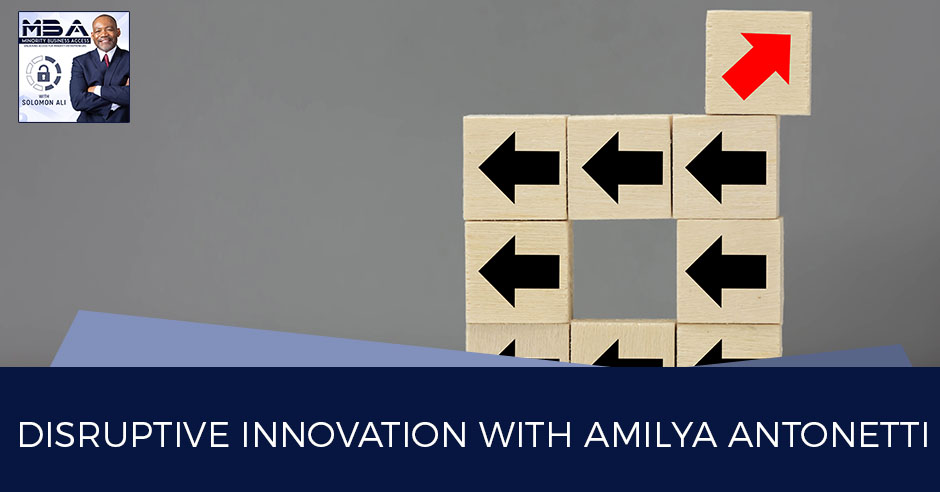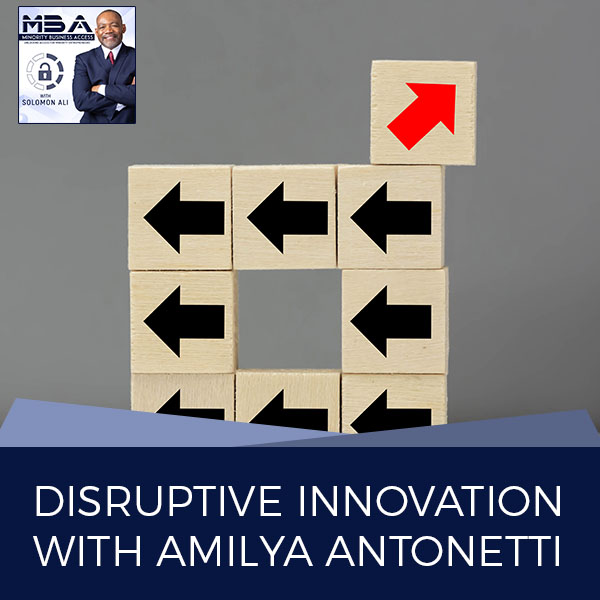
74% of people who have unique abilities are in the wrong job, but Amilya Antonetti of Genius Key has literally made it her business to tap into people’s inner desires in efforts to drive them, and the companies they work for towards success. Genius Key is positioned to disrupt the project management, personal development, and digital/social industries simply by embodying the elements of each to empower what truly drives businesses to wealth and sustainability. People. Within this global gig economy, top talents have more options to choose from. Genius Key’s purpose is to connect the individuals’ genius to the work itself. The brilliance and ingenuity of this Minority Business Access is unmatched, so do yourself the favor.
—
Watch the episode here
Listen to the podcast here
Disruptive Innovation With Amilya Antonetti
It is exciting to be here. Thank you for tuning in to the show. I am thankful and privileged. We try to bring you good content that you can learn from people who can help you, who I feel are leaders and experts in their field and what they do. I have Amilya here with Genius Key. We’re going to ask her some questions about her company, the industry, and things like that so that you can understand where the world is going. We’ll look at what employees and subcontractors, and things like that. Amilya, thank you so much for being here.
I’m excited. Thank you.
You look great as ever. Let’s jump right into it. Tell us about Genius Key and what’s going on?
Genius Key is answering a problem that businesses have had for a long time. We’re prime now for a big paradigm shift. Businesses have struggled for decades in being able to identify top talents, to bring the talent into an organization, to continue to develop them, to pair them with their highest best, and reward them for something unique to them. We continue to struggle and go back to old tools, but as more technology and digital have come into our lives on a very personal level now, top talent has a plethora of opportunities. If they can see that the company isn’t set up to further develop them, they’re not even interested anymore. We don’t have it. We don’t have a system.
Is that global or just domestically?

Disruptive Innovation: When individuals have these type of tools that connect the individual’s genius to the work itself, they take 70% more work than you could have ever given them.
It’s globally. If you take a look at the numbers, over 74% of people who have a unique ability are in the wrong job. They took the job that they could get, not the job that is their highest best. It’s the same thing if you look at stats. If I want to work for you and the only job that’s open is a sales position, I’ll apply for the sales position because you don’t have the job I want. I don’t qualify for it or I can’t even get a seat at the table. I come in through sales. If I’m in sales, I will never get out of that lane. You’ll never get to come to the sales division to go, “She’s an amazing COO.” I’ll never get that opportunity pass by me, even though I’m underneath your roof.
We have more independent contractors than ever before because top talent has a choice.
The same thing happens with efficiencies. Businesses have been able to tap into that in order to scale, they have to be able to get more and more efficient, but there isn’t a people operating system that nails down efficiency. We’re still measuring based on time and measuring the multiplier or the revenue. What causes a company from the inside to have that impact is energy in and energy out. The more efficient you can use the energy of the collective to hit those desired outcomes with the least number of resources, that’s what creates that impact, but we have no way to measure it.
You have me hanging on every word. What I find exciting is your industry. Can you tell us a little bit about your industry? What does it mean, where it’s going, and everything like that?
There are a couple of industries that have collided out of the belief of trying to make people more tactical. We heard a lot of things about trying to make humans more like technology. There are big conversations, about what are humans going to do that technology can’t do. We came out with project management systems to try to make humans more tactical. Human doesn’t develop tactically. That’s not what motivates them to get better. It’s the subcontrast. That awareness of personal development doesn’t come through tactics. We have project management that’s focusing on efficiencies, yet we’re wondering why we have all these tools but our people are not developing. Our people are not hungrier or going after the work they’re properly paired for. It’s because we have the wrong tool.
Does that mean your industry is going to grow? What kind of companies are in your industry?
There’s a couple of them. You’ve got the human behavior or the personal development space that has notoriously been out of the B2B world. It’s been in individuals.
When you say B2B, we’re talking business to business.
A business to date has not incorporated personal development skills inside the organization. The closest we’ve got was emotional intelligence. Because you can’t measure it, people don’t put a lot to it but it’s there. It’s in that space. We nibbled at it a little bit. We use a lot of personal assessments, but there wasn’t an immediate, measurable, and impactful thing for a CEO to lean into that. It came in a little bit. We’ve got the personal development space.
We have the invasion of the digital, social and technology world, which continues to grow because that has a measurable impact on a business. You have these two worlds, personal development, software technology, the social impact, and the space of companies saying the only way we’re going to be able to compete faster is with efficiencies, but we don’t have efficient operating systems. We have the old and antiquated, “This is the way we run our businesses,” or whatever.
Let me see if I understand this. You have three industries that have merged into one industry. You’re about to disrupt all three at one time.

Disruptive Innovation: The more efficient you can use the energy of the collective to get those desired outcomes with the least amount of resources, the more you can create impact.
A lot of the businesses now have been sanctioned with having a sustainable mission. A lot of companies over the last couple of years have been saying, “You have to have a sustainable mission.” Companies try to get their people to determine what does that sustainable mission going to be, but that’s like herding cats so they gave them one. “We’re going to focus on education or shoes,” but there’s no way to measure what is the motivation or what is the inner desire that your team has on what their impact is. Genius Key immediately measures their belief system on what is its impact on a global economy. You can align a sustainable mission immediately based on your people’s perspective and measure it.
If I understand correctly, what you’re saying is not only will Genius Key disrupt the whole industry, three industries that have collapsed into one, but you guys will perhaps be the largest player within that industry.
You haven’t even thought about yet the gig economy. The top talent now has a choice. What COVID did was it gave us a year to say, “Do I want to participate in the behavior that I’ve been behaving for? Do I want to keep going for this gold watch?”
When you say gig economy, some people might think that it’s crypto. I think I know what you’re talking about. You’re talking about how companies will hire people to do the work.
We have more independent contractors than ever before because top talent has a choice. They don’t want to come into the 5, 10, 15, 20-year career. Why don’t they want to? It’s because the inner operating systems of companies are broken. You look at you. Everybody looks at somebody based on your last best or your last worst experience. Even though I may be the perfect candidate to do what the company has set out to do, let’s say a company says, “This year, we are focused on disruptive innovation,” there isn’t a tool to measure, “Do your people have the innate ability to do what you’re asking for?”
Your company, Genius Key, is going to disrupt three industries in one. Because of COVID, it’s going to turn around. We’re looking at something that changed society as a whole, and how companies and everyone will do business moving forward. Because of the need now for gig workers, you’re not just at the right place at the right time, you’re it.
We’re empowering the individual. What we’re finding is that when individuals have these types of tools that connect the individual genius to the work itself, they take 70% more work than you could have ever given them, especially about behavior. If I gave you a list and I said, “Here are all the things that you love to do and you can have as many of them as you want. Here’s the abundance of things that you hate to do.” What lists are you picking from?
It’s things that I like.
If you could see everything that you love to do across the entire company, every single task that you love to do, and you could asset access it at your own pace. You do not have to wait for somebody to assign it. You can go through and go, “I want to do that.” Would you not naturally take more? That’s where the 70% increase is coming from.
As one that has always been an employer, I can only imagine my bottom line increasing tremendously because I’m getting more productivity done. It’s probably going to be more efficient and a higher quality of work because people are doing something that they’re passionate about doing, not because I assigned them a task.
Success does not happen unless you have people.
From the behavior aspect in a company, we see that people become happier. They become more engaged and more responsible. They now feel the trust factor because they’re engaged. The limitation, they can pick anything they want, their curiosities, what they love to do, things that they’ve never done before, working with colleagues that they never thought they could work with before, and then immediately measure those. The minute the task is finished, the system comes back and says, “From 1 to 5, measure all these things, time, focus, freedom, happiness, reward. How did this rate? You go through and you click. Let’s say you gave it a 4 out of 5, the system then goes, “Here’s all the 4 out of 5 projects across the entire company that matches what you did.” Now the system is getting smarter and learning what you love to do.
It’s going into artificial intelligence. How long have you been doing this?
I’ve been doing human behavior for 35 years.
It’s safe to say you’re a total expert. You know what you’re doing. I also understand that you’re going public. You’re going to have shareholders. What would that mean for your shareholders?
For the shareholders, it’s not only being able to have measurable results and not only within our company or ourselves but an enormous amount of data that’s never been seen before across all of the other companies of how people and work have a relationship. A person’s motivation isn’t necessarily on the rise. A person’s motivation is maybe just working with a colleague. It may be the curiosity. All of these other factors that we’ve never considered in the business, we’ve considered them in the personal development space. They are now inside the operating company of an organization. That organization cannot only reach into their own pool. They can reach into the gig economy to say, “I need to bring in somebody who’s got this one unique key for this project for ten days.” Now they can pick up on a whole plethora of people. It changes not just the project. It changes the entire feeling and emotion inside of the company. When you add an extra element that wasn’t there before, change is vibrant.
I have some principles that I love following. It’s helped me to identify some key things, and that’s management. Comparing management to the top five in the industry and everything of that nature, many years of your experience of doing what you do, that says everything right there. It’s also looking at the industry itself and seeing if there’s a growth opportunity within that industry and what does that look like. In your industry, what you’re talking about is you’re about to disrupt it. We like to look for at least 3% to 5% growth within the industry.
Every business has to answer this question now.
You’re about to shatter that. The industry will no longer exist. It’s going to be a completely new industry.
People are going to start looking for a genius company to go work for. They’re not going to work for a company that doesn’t have the infrastructure and the operating system to see, hear, recognize and reward them in their empowerment. We’re talking about employee empowerment in relation to work, not just employee experience.
One of the things I heard when you spoke before was it takes the biases out of it. If you are a woman or a minority that’s doing work before, you sit in front of another human and they may have some biases and not give that opportunity, but Genius Key takes the biases out. It’s not going to care if you’re a woman, where you’re from, if you’re black or whatever. It’s going to say, “This is the best person to do this job.” That to me is phenomenal.
That means probably more people will be working and doing the things that they love. Society should be better because everyone’s stress levels will be down because they’re not doing things they don’t like. More importantly, your company is going to be phenomenal from a profit standpoint because everyone is doing the things that they’re enjoying. They’ll get it done faster. They’ll get it done more efficiently and be happier for doing it. Overall, humanity would be better even post-COVID.
Until the individual or the employee clicks, “Yes, I’m interested in that project,” that’s the only time I know who they are. You’ve already looked at the project. You already know how long the project is. You know how much money you’re going to make for the project. You know what key I’m looking for from you. For you, it’s like, “I need your strategy.” You’re like, “I’m interested in a project.” When you click yes, that’s the first time I know you’re a male. It’s the first time I know you’re African-American because the work itself never cared. It’s the biases of individuals that get in the way.
Right now, there is no system that helps a CEO or a team captain to determine across everybody they can pick or who do they pick. They pick the person that they like. They pick the person that they believe is going to do the work, not the most qualified, the most energized or the most genius for the work. I give it to you because I believe that success breeds success, but you could be entirely wrong when you measure it from energy. Yes, you do it but it depletes you and I lose you for the whole work, versus if you gave me the job, I love to do that. It depletes no energy.
I know you’re excited and I’m excited too. What would you say to people looking to invest in your company because it’s disruptive, it’s in the early stage, and it seems like there’s going to be some huge rewards? The things that are going to drive it are the things that are going on in our society or that have gone in our society.

Disruptive Innovation: We’re never going to heal antiquated industries until we go inside the nucleus of the companies and start healing it from the inside.
It’s all of those things and at the end of the day, you’re healing the insides of companies. Most people have to work for somebody. There are a lot of entrepreneurs and independent contractors but the majority of people around the world need to work for somebody. Until we heal the insides of our companies, we’re never going to heal our communities, education and healthcare. We’re never going to heal antiquated industries until we go inside the nucleus of the companies and start healing it from the inside. That starts with the people because success does not happen unless you have people.
Thank you so much, Amilya. Everyone, here’s what I would like to tell you. This is a company that if you follow the principles, you’re not just going to make a decent return. You’re going to make 1,000%, 3,000%, 4,000% returns. If you don’t, give me a call and let’s talk about it. When you follow the principles of a company that’s disrupting the marketplace, you’ve got good management that has the expertise and the experience of what it is that they’re doing. They’re passionate about it. They’re willing to put their heart, soul and resources into it. They’re a new company that’s ready to go public. That’s where you receive the largest gains.
I’m not promoting it. What I am telling you is this, do your due diligence. Get in there and look at the company. You’ll see if you’re a secretary, when are you going to become a millionaire? Everyone’s heard the stories of things like that. It’s when you invest in companies when they go public. You’re able to get in the early stages. That’s what you want to be able to do. You want to go ahead and educate yourself to look at a company like Amilya’s. Figure out, “How much can I get in here and do?” That way, you know that you’re not at risk when you do that.
You’re taking it for the long haul, knowing that you will make returns because you got good management. You’re in the right industry. It has the ability to have triple-digit growth. Those are the things that are exciting. You can’t be lazy here. You got to do your homework. You got to go in there and look at how our economy has changed since COVID. Look what’s taking place and how we’re moving forward. I want to thank everyone for tuning in to the show. Thank you so very much. Amilya, thank you so much for coming on.
Thank you.
Important Links
About Amilya Antonetti
 Amilya Antonetti is a highly sought after human behavior, conflict resolution expert + Interim C Suite Executive. She has helped companies innovate, manage turnarounds, and set strategies for some of the most high-profile clients in the Music, Sports + Entertainment industries.
Amilya Antonetti is a highly sought after human behavior, conflict resolution expert + Interim C Suite Executive. She has helped companies innovate, manage turnarounds, and set strategies for some of the most high-profile clients in the Music, Sports + Entertainment industries.
Her national popularity spans a series of successes, from selling her 1st company in the late 1980’s, to successfully founding Soapworks ™, (one of the fastest growing, privately owned household product companies in North America). She eventually sold the company to a leading consumer, packaged goods company with annual sales of $200M.
Amilya has worked with businesses such as: Sharper Image, George Foreman Grill, Yummy fashion, Ninja blender, Cold Stone Creamery, Happy Napper, Kiddie Gym, Listerine Strips, Dermafina, QVC Roadshow, NBA All Stars, gymGo, Eff Creative Group, Entrepreneur Elevator Pitch + Myos.
She has worked on the foundational implementations of IBM, Watson, and Blockchain in relation to health care, marijuana, precious gems, and crypto industries. She has developed new revenue streams for celebrities such as Mike Tyson, Montel Williams, + Billy Mays. She also advised on new market development for networks, Telcom + OTT. Most recently, Amilya served as the Chief Digital Strategist + CMO for Steve Harvey and his business interests.
Throughout her career, Amilya has managed over 49,000 people in the USA and globally. Her ability to maximize Human Capital beyond biases, to focus on the holistic abilities of people, (from baby boomers, Gen X, Y, Z and the fast approaching Generation Alpha), uniting people with advanced technologies, setting up organizations to succeed from within, using their greatest asset: their “people”.
Her “in-the-trenches” experience, deep insights on the impact of the digital and virtual revolution, and unparalleled her work ethic, make her an invaluable asset to those who want to succeed in today’s fast, competitive landscape.
Some of Amilya’s awards include: Nominated (2x) Ernst & Young’s “Entrepreneur of The Year”, Fastest Under Forty, Kauffman Foundation Entrepreneur Award, Grew seven clients onto Inc’s. 500 list, She’s been recognized (3x) “Best Places to Work”, Women’s Economic Forum “Woman of the Decade” 2018 Award.

